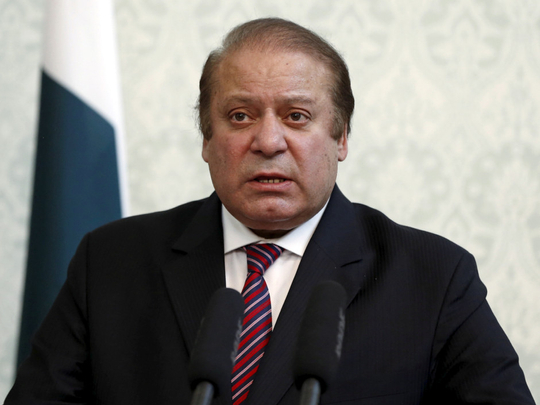
A last minute reprieve ordered last week by Pakistan’s Prime Minister Nawaz Sharif gave Afghan refugees another six months— until the end of 2016 — to stay in the country.
But the burden of responsibility on Pakistan, caused by a long-drawn Afghan conflict, is far from over. Almost four decades after Afghanistan was thrown into conflict, Pakistan lives with multifaceted consequences, including the pressure of sustaining well over three million Afghan refugees.
But in sharp contrast to the traditional image of refugees living in shabby camps, many of the Afghans in Pakistan have scattered across the country and merged with the local population. They have local IDs and in many instances ownership of local properties.
Given that those from southern Afghanistan and in many instances from the north are fluent in the Pashto language, they have successfully merged with areas of Pakistan where Pashto is widely spoken.
However, the risk to Pakistan of a proliferation of Afghan communities is evident. Pakistan’s police and security agencies have compiled detailed records of the involvement of Afghan nationals in criminality — ranging from their association with criminal and drug gangs to religious militants.
For many Afghans, according to Pakistan’s security officials, there is an added opportunity to create a malicious effect by way of committing crimes and then crossing over the border to the relative safety of Afghanistan.
Fundamentally, however, Pakistan, with its own set of economic obligations, is simply in no shape to continue caring for a large community of Afghans on its soil.
As the nuclear-armed south Asian country reels under the consequences of a major economic downturn notably in agriculture and parts of industry, Pakistan’s ability to take on additional responsibility for Afghan refugees is clearly in doubt.
The latest extension to the deadline, however, is not the first time that the Pakistani authorities have served notice on Afghans living on their soil, without successfully forcing them to leave. Going forward, Sharif and other Pakistani leaders will need to consider major steps, including some unprecedented ones to begin tackling the Afghan problem.
First and foremost, Pakistani politicians will have to carve out plans for a badly needed national consensus on the best way forward to tackle the fallout from the Afghan conflict. Today, across Pakistan, there appears to be broad public consensus on the effects of hosting Afghan refugees on Pakistan’s interests.
Yet, there are few indications of an increasingly united Pakistani view from the federal and provincial politicians to take the country towards a cohesive approach. Meeting this objective requires ruling politicians to educate and mobilise the public as never before. Just in the past week, remarks attributed to Mahmoud Khan Achakzai, a politician from the south-western Balochistan province, supporting full freedom of movement for Afghan refugees in parts of Pakistan, has highlighted the divisions among politicians.
Second, Pakistan’s leaders will have to agree on new, wide-ranging measures to deal with the internal security fallout from the presence of Afghans in the country.
This will have to be built upon a comprehensive plan to record the concentrations of Afghans across Pakistan, followed by a concerted push to force them to areas closer to the Afghan border. This may indeed be much easier said than done.
However, a broad agreement on the scale of the challenge and the best way forward must be the first vital step in dealing with what is effectively a national calamity for Pakistan. As long as dissenting politicians like Achakzai continue to dominate part of the discussion, moving towards a badly-needed national consensus will indeed remain out of reach.
Finally, Pakistan needs to aggressively review both its strategy and ability to bring peace to Afghanistan — a necessary prerequisite for the refugees to begin returning home. In recent years, Pakistan has been part of a push to bring warring Afghan factions to the negotiating table. Yet, Pakistan has also borne the brunt of US-led criticism over its ties to violent hard-line groups in Afghanistan, notably the Haqqani network, which US officials say has led anti-government violence in Afghanistan.
There are no easy or straightforward explanations of the exact impetus for the continuing violence in Afghanistan. Since December, 2014, when Pakistan was left in a state of shock following a Taliban attack on a school in Peshawar, which left more than 140 people dead, mostly children, the Pakistan army has aggressively pursued hard-line militants. And yet, one complicating part of this campaign highlights a grave challenge. The ring leader of the Taliban remains on the run in Afghanistan, beyond Pakistan’s reach and possibly that of the Afghan authorities too.
Given the complexity surrounding this issue, no single player can begin to resolve the Afghan conflict. And that’s where Pakistan’s diplomacy becomes vital for the country’s ability to influence future trends. More than three years after his election as prime minister for the third time, Sharif continues to oversee the foreign ministry in Islamabad without appointing a full time foreign minister. This is perhaps the most blatant indication of Sharif’s failure to put in place a coherent mechanism to tackle foreign policy challenges including Afghanistan.
And in the meantime, even if other key foreign players continue to make only modest progress in ending the conflict, Pakistan must redouble its efforts to manage the domestic fallout from Afghanistan. Ultimately, Pakistan will have to live with the consequences of a continuing war right next door, with no end in sight.
Farhan Bokhari is a Pakistan-based commentator who writes on political and economic matters.











